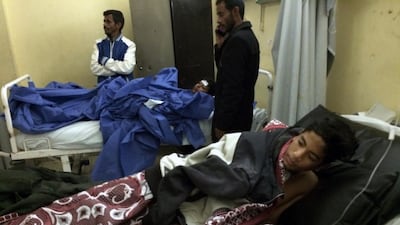These are some, but by no means all, of the killings perpetrated by sundry militant groups this century:
2004: on October 7 a lorry drove into the lobby of the Hilton hotel in Taba and exploded, killing 31 and injuring 159 as ten floors of the hotel collapsed. On the same day, two more bombings occurred 50 kilometres south of Taba at campsites at Ras Al Shitan, killing three Israelis and a Bedouin. About half of the victims were foreigners. The Egyptian government said Palestinians were responsible.
2005: on July 23, Egypt's Revolution Day, a series of bombings targeted Sharm El Sheikh, the resort city at the southern tip of the Sinai Peninsula, killing 88 and wounding more than 150. The Abdullah Azzam Brigades, a group claiming ties to Al Qaeda, were the first to say they did it, but two other groups, the Tawhid and Jihad Group in Egypt and the Holy Warriors of Egypt also claimed responsibility.
2006: on April 24, a public holiday to celebrate the Spring Festival, a series of bombs exploded in Dahab, a resort popular with both foreign tourists and Egyptians on the Gulf of Aqaba coast of the Sinai Peninsula. At least 23 people died, most of them Egyptians. The 80 wounded included Europeans, Australians, Americans and citizens of other Middle Eastern countries and South Korea. The explosive devices proved to be nail bombs detonated by timers. Egyptian security said the perpetrators were Jama'at Al Tawhid Wal Jihad (Monotheism and Jihad).
2011: a car bomb exploded outside a Coptic church in Alexandria after the evening service, killing at least 23 and injuring 43. The Egyptian government blamed the Army of Islam.
2015: On October 31, Metrojet flight 9268, a Russian-operated charter flight from Sharm El Sheikh to Saint Petersburg fell from the sky, killing all 224 on board. The victims were mostly Russian tourists. The most probable cause of what was till then the deadliest terrorist attack in Egypt was a bomb smuggled on board at the departure airport. ISIL has claimed responsibility several times for the attack.
2016: on December 11, there was an explosion next to Saint Mark's Coptic Orthodox cathedral in Cairo, at the church of Saints Peter and Paul. Twenty-nine people — mostly women and children — were killed. The cathedral is the seat of the head of the Coptic Orthodox church. ISIL claimed responsibility.
2016: on January 8, two suspected militants stormed the Bella Vista hotel in Hurghada on the Red Sea and stabbed two foreign tourists to death. ISIL claimed responsibility.
2017: twin suicide bombings killed a total of 45 people and injured 126 on April 9 — Palm Sunday, the start of the Christian Holy Week — during mass at St George's church in the northern city of Tanta in the Nile Delta and later that day at St Mark's cathedral in Alexandria. The latter bombing occurred minutes after Pope Tawadros II left the church to follow developments in the Tanta tragedy. The ISIL-affiliated Amaq news agency claimed "a security detachment" of ISIL carried out the attack. Egypt declared a three-month state of emergency.
2017: on May 26 — the eve of Ramadan — masked gunmen ambushed a convoy of three vehicles taking Coptic Christians to the remote monastery of St Samuel the confessor in Maghagh, 220 kilometres south of Cairo in Minya province. Eight to 10 masked men in military uniforms fired on the minibuses, killing at least six people including two small children. They boarded the buses, stealing mobile phones and jewellery from the women and killing the men. Some men and boys were also removed from the bus and ordered to renounce their Christian faith. When they refused they were shot. In all, 28 people died. The gunmen drove away in three off-road vehicles.
Amaq news agency attributed the attack to " a group belonging to Islamic State". ISIL, which had vowed to escalate attacks against Christians after Pope Francis's visit to Egypt the previous month, later officially claimed credit.

